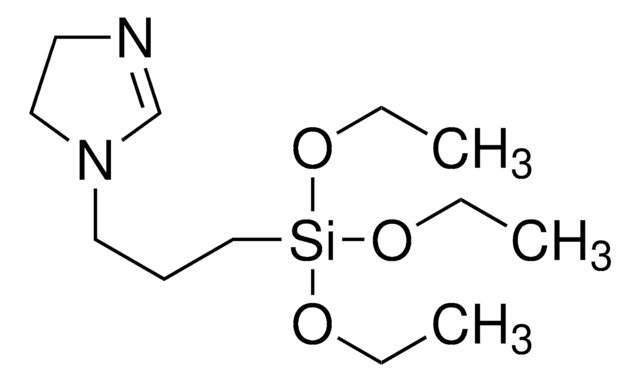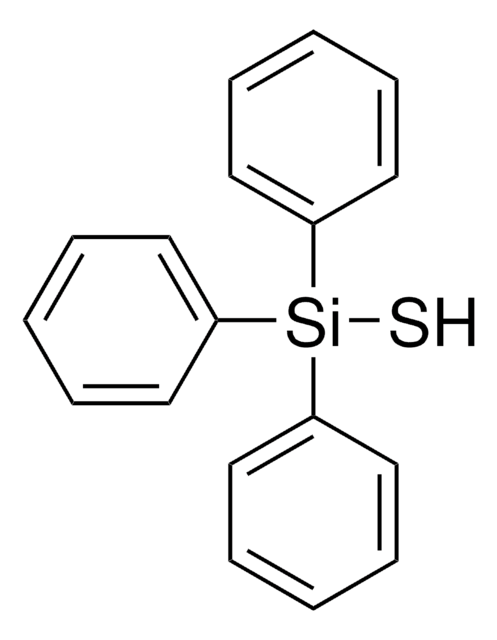63797
(3-Mercaptopropyl)triethoxysilane
≥80% (GC), technical
Synonym(s):
3-Triethoxysilyl-1-propanethiol
Sign Into View Organizational & Contract Pricing
All Photos(1)
About This Item
Linear Formula:
HS(CH2)3Si(OCH2CH3)3
CAS Number:
Molecular Weight:
238.42
Beilstein:
2039575
EC Number:
MDL number:
UNSPSC Code:
12352103
PubChem Substance ID:
NACRES:
NA.22
Recommended Products
grade
technical
Quality Level
Assay
≥80% (GC)
density
0.987 g/mL at 20 °C (lit.)
functional group
thiol
storage temp.
2-8°C
SMILES string
CCO[Si](CCCS)(OCC)OCC
InChI
1S/C9H22O3SSi/c1-4-10-14(11-5-2,12-6-3)9-7-8-13/h13H,4-9H2,1-3H3
InChI key
DCQBZYNUSLHVJC-UHFFFAOYSA-N
General description
3-mercaptopropyl trimethoxysilane (MPTMS) is commonly used in surface modification of silica nanoparticles by creating thiol group on the surface.
Application
(3-Mercaptopropyl)triethoxysilane (MPTS) can be used as a reagent to prepare thiol functionalized materials. Silica, SBA-15, alumina, starch, and graphene can be functionalized with MPTS and used in various applications.
MPTS functionalized SBA-15 probe is used to determine dissolved mercury in solution.
MPTS functionalized SBA-15 probe is used to determine dissolved mercury in solution.
Hazard Statements
Precautionary Statements
Hazard Classifications
Aquatic Chronic 2
Storage Class Code
10 - Combustible liquids
WGK
WGK 3
Flash Point(F)
190.4 °F - closed cup
Flash Point(C)
88 °C - closed cup
Personal Protective Equipment
dust mask type N95 (US), Eyeshields, Gloves
Choose from one of the most recent versions:
Already Own This Product?
Find documentation for the products that you have recently purchased in the Document Library.
Customers Also Viewed
Hongqiang Zhai et al.
International journal of molecular sciences, 19(12) (2018-11-30)
Dimercaptosuccinic acid (DMSA) is an oral heavy metal chelator. Although DMSA is the most acceptable chelator in the urinary excretion of toxic elements from children and adults, its defects in plasma binding and the membrane permeability limit its interaction with
Surface modification of nanosilica with 3-mercaptopropyl trimethoxysilane: Experimental and theoretical study on the surface interaction
Wu J, et al.
Chemical Physics Letters, 591, 227-232 (2014)
Fabrication of hybrids based on graphene and metal nanoparticles by in situ and self-assembled methods
He F-A, et al.
Nanoscale, 3(3), 1182-1188 (2011)
Electroless copper deposition on (3-mercaptopropyl) triethoxysilane-coated silica and alumina nanoparticles
Mondin G, et al.
Electrochimica Acta, 114, 521-526 (2013)
Zidan Wang et al.
Nanoscale, 10(11), 5335-5341 (2018-03-07)
A novel zwitterionic hydrophilic magnetic mesoporous silica was prepared for endogenous glycopeptide enrichment prior to MS analysis. For the first time, the material was successfully applied in capturing endogenous glycopeptides from human saliva, indicating great potential of this strategy for
Our team of scientists has experience in all areas of research including Life Science, Material Science, Chemical Synthesis, Chromatography, Analytical and many others.
Contact Technical Service




![Bis[3-(triethoxysilyl)propyl] tetrasulfide technical, ≥90% (NMR)](/deepweb/assets/sigmaaldrich/product/structures/242/790/625f5cba-32bd-4acf-a3be-e119e9cf844f/640/625f5cba-32bd-4acf-a3be-e119e9cf844f.png)









![N-[3-(Trimethoxysilyl)propyl]ethylenediamine 97%](/deepweb/assets/sigmaaldrich/product/structures/149/508/f87a9a89-f138-4c5e-9fe0-6561914241c3/640/f87a9a89-f138-4c5e-9fe0-6561914241c3.png)
